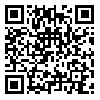BibTeX | RIS | EndNote | Medlars | ProCite | Reference Manager | RefWorks
Send citation to:
URL: http://jdisabilstud.org/article-1-3221-en.html
2- Assistant Professor, Department of Psychology and Education of Exceptional Children, Science and Research Unit, Islamic Azad University, Tehran, Iran
Abstract
Background & Objectives: Adolescence is a stage of growth that covers the age range of 10 to 19 years and is the beginning of physical, mental, social, and spiritual changes and transformations. Resilience is one factor that makes teenagers more adaptable to life's needs and threats. Resilience is the ability to move forward with problems; that is, despite a person facing stress, worry, and problems, he or she can do his or her personal, social, competitive, and environmental tasks and continue his or her work duties. Resilience helps people to protect themselves against psychological problems such as anxiety, depression, and anger. One treatment program to reduce teenagers' behavioral problems is growth mindset training. Considering the existing research gap regarding using the growth mindset training program for adolescents with behavioral problems, the present study investigated the effectiveness of growth mindset training in improving the resilience of adolescents with behavioral problems.
Methods: The present study is quasi–experimental with a pretest–posttest and a 2–month follow–up design with a control group. This study's statistical population comprised all adolescent girls aged 12 to 16 who attended the first secondary schools in Tehran Province, Iran, in 2021–2022. Using a method of purposive sampling, 30 individuals were selected from the statistical population and randomly assigned to the experimental and control groups. Data were collected during therapy sessions using the Achenbach Youth Self–Report Scale (Achenbach and Rescorla, 2001) and the Connor–Davidson Resilience Scale (Connor & Davidson, 2003). The experimental group then participated in the growth mindset training program over five weeks and ten 1–hour sessions. However, no treatment sessions were held for the control group. Descriptive statistics (central and dispersion indices) were used to analyze the data, and repeated measures analysis of variance and Bonferroni post hoc test were used to test the hypotheses in SPSS software version 26. The significance level of the tests was set at 0.05.
Results: Based on the results, the interaction effect of group and time on the resilience variable and its components, including self–perception of personal competence, trust in personal instincts, acceptance of positive emotions, restraint, and spirituality, was significant (p<0.05). In the posttest and follow–up, there was a significant difference between the growth mindset training and control groups in the resilience variable and its components (p<0.05). In the growth mindset training group, there was no significant difference between the posttest and follow–up in the resilience variable and its components in adolescent girls with behavioral problems, indicating the stability of the effectiveness of the training until the follow–up period (p>0.05). However, the mean score of the resilience variable and its components in the posttest increased significantly compared to the pretest (p<0.05).
Conclusion: According to the study results, the growth mindset training program effectively promotes resilience in girls with behavioral problems.
| Rights and permissions | |
 |
This work is licensed under a Creative Commons Attribution-NonCommercial 4.0 International License. |




